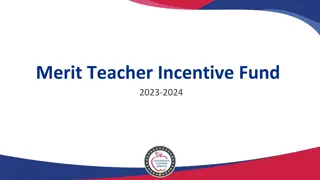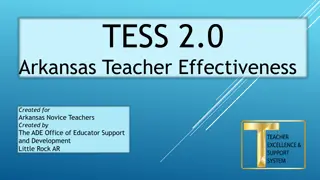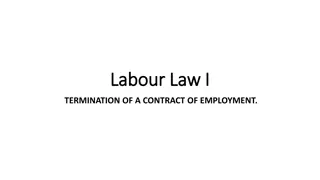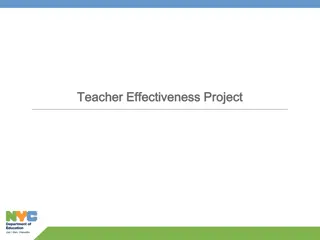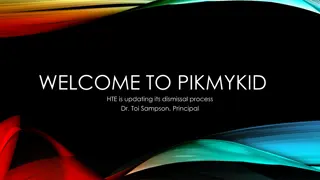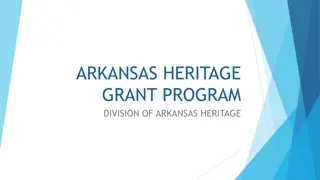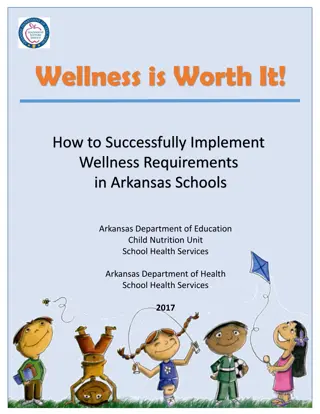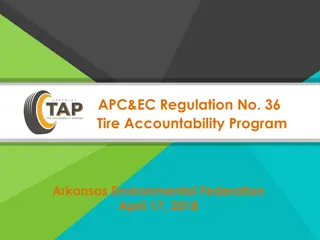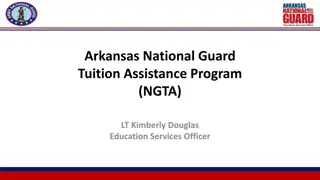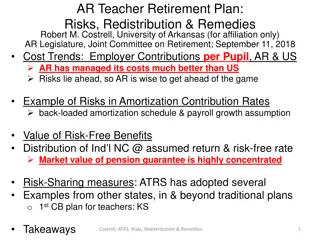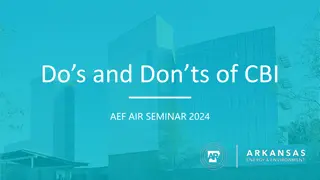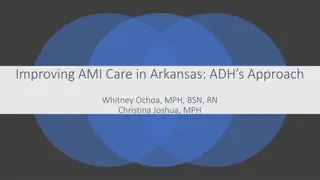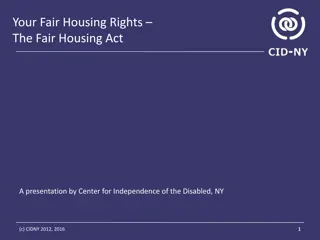Arkansas Teacher Fair Dismissal Act Overview
Personnel matters for teachers in Arkansas are governed by the Arkansas Teacher Fair Dismissal Act (ATFDA), which covers terminations, non-renewals, reductions in force, and evaluations leading to employment action. The act applies to certified employees, detailing procedures for performance and conduct issues, including the distinction between poor performance and policy violations. The law also defines who qualifies as a teacher under ATFDA, excluding superintendents and assistant superintendents.
Download Presentation

Please find below an Image/Link to download the presentation.
The content on the website is provided AS IS for your information and personal use only. It may not be sold, licensed, or shared on other websites without obtaining consent from the author. Download presentation by click this link. If you encounter any issues during the download, it is possible that the publisher has removed the file from their server.
E N D
Presentation Transcript
ADMINISTRATOR TRAINING JAY BEQUETTE CODY KEES BEQUETTE, BILLINGSLEY & KEES, P.A. 425 WEST CAPITOL AVENUE, SUITE 3200 LITTLE ROCK, AR 72201-3469 PHONE: (501) 374-1107 FAX: (501) 374-5092
ARKANSAS TEACHER FAIR DISMISSAL ACT
Personnel matters concerning teachers are largely governed by the Arkansas Teacher Fair Dismissal Act ( ATFDA ) Teacher is anyone required to hold a teaching certificate Includes: Principals, Counselors, Instructional Facilitators Does Not Include: Superintendents, Dep. Supts. or Assist. Supts. Applies to: (1) terminations, (2) non-renewals, (3) Reductions In Force and (3) evaluations which could lead to employment action
For Starters EMPLOYEE: classified employee? 2 different laws apply, but both have detailed procedures. Arkansas Teacher Fair Dismissal Act (applies to teachers) Arkansas Public School Employee Fair Hearing Act (applies to classified staff) Are you dealing with a certified employee (licensed) or a PERFORMANCE OR CONDUCT: Are you dealing with a teacher who is poorly performing in the classroom or one who just violated a policy/law (conduct)? Termination for performance involves detailed documentation Conduct related termination is a judgment call
Teacher under ATFDA: Is a teaching license required for the position? Even if the employee has a certification he may not be a teacher under ATFDA if a teaching license is not required for his position. Example: Your maintenance director is a retired math teacher who has maintained his teaching certificate, but the job posting does not require a teaching certificate and he does not instruct students.
A teacher? A speech therapist is hired and has an elementary certificate. She has no teaching duties. Over the course of several years she is given a conference period, assigned duty time, given a duty-free lunch, serves as a club sponsor and assists in proctoring state exams. You want to non-renew her contract because of decreased enrollment/funding.
Who Does the Law Cover? ATFDA applies to all who are required to hold a teaching license except for superintendents and assistant superintendents. Only the superintendent may recommend suspension, nonrenewal or termination. i.e. only he/she can sign the notice letter ATFDA applies to both probationary (teachers who have not completed three successive years of employment in any AR district) and nonprobationary licensed staff The only material difference in the law is that nonprobationary licensed personnel have a statutory right to appeal the board s decision to circuit court within 75 days of the written notice of board action.
ATFDA- Superintendent Driven Process Board member is upset with a high school principal and wants to bring a termination proceeding against him. No. Termination proceedings can only occur by an act of the Superintendent, often with input from building principals, by signing a notice letter and bringing the recommendation before the board.
Conduct Driven Non-Renewal or Termination Conduct: Conduct which materially interferes with the continued performance of the teacher s duties, repeated or material neglect of duty, or other just and reasonable cause. Does NOT include incompetent performance performance driven termination needs documentation of deficiencies and improvement efforts by administration Examples of Conduct violations: Drug /possession Theft of school funds Intoxication at school Repeated no-call/no-show Sexual advancements/ harassment toward student/ co-worker
Just and Reasonable Cause Termination, non-renewal or suspension of a licensed employee requires just and reasonable cause. The plain meaning of those words are just means fair, and reasonable means that it makes sense. Just and reasonable cause can also mean the following:
Just and Reasonable Cause Was the employee adequately warned of the consequences of his conduct? Was the rule or order reasonably related to efficient and safe operations? Did the administration investigate before administering the discipline? Was the investigation fair and objective? Did the investigation produce substantial evidence or proof of guilt? Were the rules, orders and penalties applied even handedly and without discrimination? Was the penalty reasonably related to the seriousness of the offense and the past record? Rule #1: does the superintendent believe the board will uphold his recommendation?
Current School Year The conduct or offense being used as the grounds of termination or non-renewal must occur in the current school year. Non-renewal or termination based exclusively on conduct occurring in prior years will be held arbitrary and capricious. Allen v. Texarkana Pub. Sch., 303 Ark. 59, 794 S.W.2d 138 (1990).
Performance Driven Non-Renewal or Termination Examples: Poor classroom management Ineffective lesson planning Excessive tardiness Poor hygiene Poor parent communication If you don t document it is like it never happened!
Performance Driven Non-Renewal or Termination Documentation Cite the date and details of the incident Explain what the teacher did wrong Cite to any applicable policies Establish what is expected Give guidance, assign training, readings, mentor teacher, etc. Consider an improvement plan EXAMPLES
Group Break-Out Elementary counselor is spending more than 25% of her time on administrative task and less than 75% on direct counseling services to students, in violation of state law. Her work load is no greater than other counselors. She oversees state testing and she will occasionally conduct placement testing for new students to the district. She is involved with parent involvement and yearbook. Game Plan Direct her, in a memo, to spend 75% of her time on direct counseling Provide her training or literature on what counts as direct counseling Require her to keep a monthly calendar to monitor her time Consider taking non-counseling duties from her
Group Break-Out Same counselor went over allotted administrative time 3 months in a row. Game Plan Add a reprimand to her file, which addresses what the District has done to help her and the District s ongoing efforts Consider requiring the principal to make her schedule Put her on an Intensive Support Plan for following year ISP will require monthly reviews.
Conduct Issues That Could Lead To Termination Proper District handling
Group Break-Out Principal is notified by a parent on Monday that a male coach was seen on Saturday night with a 10th grade female student ( who was identified by the parent and not a relative of the coach)in his car and the next morning she was seen leaving his apartment. No further information is given. Game Plan Meet with employee ASAP (He has the right to a witness) If he denies the allegation, no contact with the student If even slightest admission, immediate administrative paid leave (consult HR/ Supt) Call DHS Hotline, complete a child maltreatment report Notify student s parent/ guardian. However, be careful not to share personnel information Meet with any student witnesses (be cautious here) Take detailed notes with dates Obtain statements (dates and names!)
Group Break-Out The coach calls the principal later that day and confesses to being alone with the minor student, allowing her to stay at his house, denies criminal activity, but mentions they may have kissed, says she drank his beer without his permission. He is adamant he did nothing wrong, wants to return to work. Game Plan Update DHS/ update police involved or the resource officer Update HR/ Supt and other necessary administrators Prepare for the termination process
Group Break-Out Investigations- Additional Considerations Upon notice of potential child maltreatment, the District must take action, it cannot be deliberately indifferent Teacher always gets a right to a witness during any questioning Depending on the situation, an outside investigator may be needed If the teacher is not placed on immediate leave, ensure there is no continued contact between the student and teacher (change schedules, have another staff member in the room during class period/ practice) Keep documentation Keep parents informed
Performance Driven Non-Renewal or Termination Performance: Every teacher shall be evaluated in writing under the Teacher Excellence and Support System (TESS) At anytime other than the evaluation performed under TESS, if an administrator has reason to believe a teacher is having difficulties or problems meeting the expectations of the school district or administration, the superintendent or other school administrator shall: Incompetent performance In writing, bring the problems and difficulties to the attention of the teacher; and Document efforts to assist the teacher to correct what appears to be cause for non-renewal or termination.
Termination Process A certified teacher is entitled to a hearing any time he receives the required notice that he is being recommended for termination or non-renewal. That notice must be in writing and include a detailed statement of the reasons for the recommendation, setting forth the reasons in separately numbered paragraphs so that a reasonable teacher can prepare a defense. 1. Notice Letter: A key document. Have it prepared and/or reviewed by legal counsel.
Termination Process Notice Letter Hand delivery to teacher or send to teacher s last known address, certified mail Statement of the grounds for recommendation of termination in separate paragraphs Notice of right to hearing Notice of the time window for having a hearing Notice of right to be represented by legal counsel Notice that a transcript of the proceeding can be provided at the District s expense
Termination Process Notice Letter If the reason for the termination is not in the letter, it cannot be part of the hearing.
Termination Process Notice Letter A teacher is given a notice of termination stating the reason is her continued failure to follow her students IEP (there was sufficient warnings and documentation) At the hearing her principal wants to discuss her tardiness and absenteeism, as he thinks this will help the board understand why the teacher does not follow IEPs. Can this be part of the hearing?
Termination Process 1. A teacher who receives the written notice of recommended termination or non-renewal may file a written request with the board of directors of the district for a hearing. 2. Said written request for a hearing must be received within thirty (30) calendar days after the written notice of proposed termination or non-renewal is received by the teacher.
Termination Process Upon receipt of a request for a hearing, the board shall grant a hearing in accordance with the following provisions: The hearing shall take place at a time, agreed upon in writing by the parties, but if no time can be agreed upon, then the hearing shall be held not less than five (5) calendar days nor more than twenty (20) calendar days; The hearing shall be public unless the teacher requests that the hearing be public; If an open meeting, it can be closed if a student is called as a witness. The teacher and the board may be represented by representatives of their choosing; Teacher can use a family member/non-lawyer
Termination Process Teacher can request a transcript of the hearing The board shall not consider at the hearing any new reasons which were not specified in the notice provided to the teacher. Hearing Officer Often used by Districts where no board member is familiar with ATFDA. Hearing officer conducts the hearing, advises the board on the law. Appeal to Circuit Court Arkansas courts will generally not substitute their judgment for that of school administration or the school board. Arkansas court decisions have accorded the school boards wide latitude and discretion in the operation of a school district.
What Does a Hearing Look Like? Law contains no specific guidelines as to how it is to be conducted. The Board should be completely neutral. If you have prior knowledge that might impact your decision, should you consider recusal? Administration presents first, it has the burden of proof. Any witness called by any party can be cross-examined by the other side. The Board can ask questions, typically at the end of each witness. Both sides may present relevant evidence. Such evidence should be provided to the opposing side in advance. Opening and closing statements. No time limit. Caution: Teacher s defense related to other staff or students should be avoided. Remember the spirit of the law: to provide the teacher with the opportunity to present a defense.
Post Hearing Procedures It is important to note that following any hearing granted by the ATFDA, the board shall by majority vote make specific written conclusions with regard to the truth of each reason given in support of the termination or non-renewal. Finally, a copy of the decision of the board must be subsequently furnished in writing to the teacher, either by personal delivery, registered or certified mail.
Remedies and Damages Failure to substantially comply with the ATFDA can result in the reinstatement of a non-desirable teacher as well as expense to the district in the form of back pay. Normally, the proper measure of damages in these cases where a teacher prevails is the salary which the teacher lost up to and including reinstatement, less mitigation for earnings realized through other employment. Actions under the ATFDA are within the meaning of Arkansas attorney fees statutes. As such, attorney s fees and costs may be awarded to the prevailing party in any action brought under the ATFDA. Damages and costs can be enormous and material to district operations (see Texarkana School District $750,000 settlement in 2011).
Reassignment A change in the teacher s job responsibilities raises the question of whether the situation involves a reassignment of duties, which does not trigger the ATFDA, or if the change in duties was a non-renewal under the ATFDA. Reassignment Any change in placement/position with the same pay as long as it is not a material change in duties Moving teacher from 9th grade to 10th grade English Moving counselor from middle school to high school However, a school district s action against a teacher is a non-renewal, rather than a reassignment of duties, where the teacher suffers a material reduction in salary and a material change in his duties. Moving HS principal to an elementary school principal Moving an assistant principal to the bus barn
Non-Renewal All teacher contracts renew under the same terms and conditions on May 1st of every year unless the teacher is given notice of any change, and all rights under ATFDA Due to declining enrollment your school has been reconfigured as a k-6 and 7-12 school and you no longer need a middle school principal Give the principal notice of non-renewal by May 1st and she gets a full hearing WHAT IF: You plan to move the principal to the HS as an assistant principal and she keeps her salary. Does she get a hearing?
Partial-Nonrenewal A teacher has a standard contract and a stipend to be the parent involvement coordinator. The stipend piece will not be needed for the next school year. What do you do? P.S. Make sure and take the stipend off any salary schedule for the next year before you present it for board approval
Suspensions The ATFDA does not apply to any disciplinary suspensions that are not imposed in the context of a recommendation of termination or the non-renewal of the teacher s contract. The ATFDA applies only to suspensions that are imposed in connection with a recommendation of termination or non-renewal. Arkansas law allows superintendents to suspend teachers without pay, as long as the suspension is not imposed in connection with a recommendation of termination or nonrenewal. SeeMcGough v. Pine Bluff Sch. Dist., 79 Ark. App. 235 (2002).
Recent Cases Reduction in Force Upheld District s nonrenewal of teacher during reduction in force upheld because district policies required evaluation of needs and goals. Teacher was not needed to teach social studies due to decreases in enrollment and funding. Another teacher was less senior, but he was retained in a different licensure area (PE/Coach). District s non-renewal of a staff speech therapist who was also a certified teacher upheld because the District had evidence it would be less expensive (better use of District resources) to purchase therapy from a 3rd party provider.
Recent Cases Termination Unlawful Teacher employed pursuant to additional licensure plan, but teacher did not complete ALP. District recommended termination, but the employment contract was for a high school teacher, not a specific license area. Teacher was licensed to teach in high school, just not in the license area for the ALP. Court held that it could not look outside the contract to other evidence to show that completion of ALP was required by contract.
Recent Cases Non-Renewal Teacher employed as a counselor and test administrator. During a two-week period in the spring, during ASPIRE testing, teacher botched the testing: failed to enter data correctly, did not complete student profiles, did not accurately administer test to 504/ IDEA students. Teacher received 5 write-ups in the two-week period. Court ruled the time-frame was too narrow to allow the teacher to correct issues and an improvement plan was required.
Recent Cases Termination Unlawful District s nonrenewal of counselor violated ATFDA because it was unreasonable to blame counselor for seniors not having enough credits to graduate since the student handbook, on which the counselor relied, incorrectly listed the number of credits required. No substantial compliance with ATFDA where the counselor was only evaluated once in 14 years with district, so there was no need to even determine if district attempted to help the counselor correct his performance deficiencies.
ARKANSAS PUBLIC SCHOOL EMPLOYEE FAIR HEARING ACT
A. 6-17-1702. Definitions. Employee a person who is not required to have a teaching license as a condition of employment. Full-time employee at least twenty (20) hours per week. Probationary employee has not completed one year of employment. B. 6-17-1703. Termination or Nonrenewal. Superintendent s recommendation must be in writing. Recommendation must be made no later than thirty (30) calendar days prior to beginning of employee s next contract period. Employee is entitled to a hearing before the Board upon written request within twenty-five (25) days of notice.
C. 6-17-1704. Immediate Suspension. Employee may be immediately suspended provided written notice of the action is sent within two (2) school days. Notice shall include a statement of reasons and advise of the right to hearing. D. 6-17-1705. Hearing. The hearing may be public or private at the request of the employee. Employee may be represented by a person of his/her choice. Board may terminate the employee or continue the suspension for a definite period of time.
ADMINISTRATIVE INVESTIGATIONS
Importance of a Good Investigation reinforce district s position on importance of its policies counteract negative publicity promotes good behavior and deters poor behavior decreases district liability and prevents/discourages lawsuits Big Brother Is Watching U.S. Dept. of Justice FBI U.S. Dept. of Education/OCR Dept. of Labor DHS ADE Arkansas Attorney General State, county and local law enforcement
Determining Whether Investigation Is Necessary and How it Should Be Conducted Is an investigation necessary? will a single answer resolve the issue? other employees involved? need more facts than the employee/complainant/whistleblower able to provide? Avoid Common Mistakes inaction/ignoring complaint untimeliness/failing to act promptly (fresh memories) sloppiness: poor notes/inadequate records investigation not thorough or complete failing to diffuse an immediate crisis/escalation lack of follow-up to ensure closure with all stakeholders (complainant/victim; accused; immediate supervisor; board) decide ultimate credibility issues at end of investigation, not during
Personnel Conducting the Investigation Issues internal/external (impartiality) scope (short or lengthy) outside legal counsel < attorney becomes witness independent counsel (supervise investigation) attorney-client privilege FOIA FERPA (Family Educational Rights and Privacy Act) Potential for Retaliation claims Same sex as victim? Relationship with victim or accused? Immediate supervisor or higher? (comfort levels, retaliation, supervisor involved)
PERSONNEL POLICIES GRIEVANCE PROCEDURE
6-17-208. Grievance Procedure. (a)(1) It is the public policy of the State of Arkansas that: (a)(1)(A) Each school district shall have a written grievance procedure that provides for an orderly method of resolving concerns raised by an employee at the lowest possible administrative level and in a clear and timely manner for both parties; and (a)(1)(B)(i) All school employees shall have the right to file grievances and have those grievances heard. (a)(1)(B)(ii) A group of employees who have the same grievance may file a group grievance.
6-17-208. Grievance Procedure. (a)(2)(A) Grievance means any concern related to personnel policy, salary, federal or state laws and regulations, or terms or conditions of employment raised by an employee. (a)(2)(B) Employee means a person employed by a school district under a written contract.
6-17-208. Grievance Procedure. (b)(1) The grievance policy shall include at least the following provisions: (b)(1)(A) A procedure for resolving the matter informally with the employee s immediate supervisor; (b)(1)(B) A procedure to appeal in writing an unsatisfactorily resolved grievance from the immediate supervisor to the superintendent of schools or his or her designee; (b)(1)(C)(i) A procedure to appeal in writing an unsatisfactorily resolved grievance from the superintendent or his or her designee to the school board of directors at the next regularly scheduled school board of directors meeting unless both parties have agreed to a different date.











